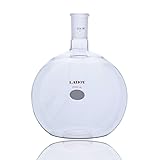All Categories








Laboy Glass Single Neck Flat Bottom Boiling Flask 500mL with 24/40 Joint Heavy Wall Distillation Receiving Apparatus Organic Chemistry Lab Glassware
Share Tweet
Get it between 2024-12-31 to 2025-01-07. Additional 3 business days for provincial shipping.
*Price and Stocks may change without prior notice
*Packaging of actual item may differ from photo shown
- Electrical items MAY be 110 volts.
- 7 Day Return Policy
- All products are genuine and original
- Cash On Delivery/Cash Upon Pickup Available








Laboy Glass Single Neck Flat Bottom Boiling Flask Features
-
HEAVY WALL ---Laboy glass flasks are heavy wall design , made by hand-blowing according to ASTM E438 ,made of high-quality borosilicate glass and annealed at 800 degree Celsius ,can be heated directly in an open flame and can withstand typical laboratory thermal variations in Chemistry processes like heating and cooling,durable and reusable.
About Laboy Glass Single Neck Flat Bottom Boiling Flask
The flat bottom flask is likely the other round bottom flask but with a flat bottom allowing it standing up flat surface as the flask can sit upright on its own. Capacity of 500mL with 24/40 glass ground taper joint. It can be used in heading during distillation, they are not as durable as round bottom flasks for heating better than Erlenmeyer flask which has have the sharp and vulnerable corners . Laboy glass flasks are heavy wall design, made by hand-blowing to ensure uniform wall thickness, and made of high-quality borosilicate glass and annealed at 800 degree Celsius, can be heated directly in an open flame and can withstand typical laboratory thermal variations in Chemistry processes like heating and cooling.




















